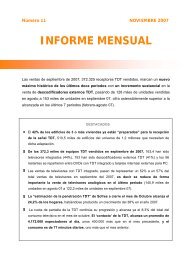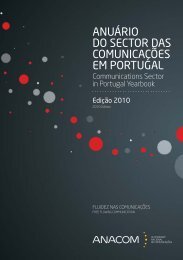The Price of Plurality - Stakeholders - Ofcom
The Price of Plurality - Stakeholders - Ofcom
The Price of Plurality - Stakeholders - Ofcom
You also want an ePaper? Increase the reach of your titles
YUMPU automatically turns print PDFs into web optimized ePapers that Google loves.
44John Whittingdaleforecasting that this would fall to around £25 million per year afterdigital switchover.Despite the Government’s commitment to plurality, it is the case thatthe vast majority <strong>of</strong> its support for public service content has beenconcentrated on one provider, the BBC. One option that has beenraised to ensure plurality in the provision <strong>of</strong> public service contentis the distribution <strong>of</strong> public funding to more than one broadcaster.Countries such as Canada and New Zealand both employ this type<strong>of</strong> model to distribute public funding to broadcasters and productioncompanies to make certain types <strong>of</strong> public service content. In theUK, the Government has stated that it will review the case for makingpublic funding more widely available beyond the BBC, with a reviewmost likely to commence in 2009. If it were to conclude that publicmoney should be distributed more widely, a number <strong>of</strong> fundingsources would potentially be available, but only two sources have arealistic chance <strong>of</strong> being allocated: general taxation; or licence feeincome.Many commentators support the idea <strong>of</strong> making television licencefee income available to providers other than the BBC, in particularby doing so on a contestable basis. Lord Burns, in his advice on BBCCharter Review to the Secretary <strong>of</strong> State for Culture, Media and Sport,said that wider distribution <strong>of</strong> licence fee funds, via competition,would help sustain plurality in public service content. He envisagedthe creation <strong>of</strong> an independent Public Service BroadcastingCommission, which would be able to award part <strong>of</strong> the licence feeto other broadcasters (Burns 2005). Irwin Stelzer, Director <strong>of</strong> EconomicPolicy Studies at the Hudson Institute, said that there should be asmuch competition within the funding framework as possible and thatcompetitive bidding for licence fee income would get the best out <strong>of</strong>the system (HC 36–II 2007b).<strong>The</strong>re are, <strong>of</strong> course, risks involved with this approach. For example,if public funding is made available to commercial broadcasters,there is a risk that public money may be used to fund programmingthat is otherwise viable on some commercial basis, raising thepotential for the distortion <strong>of</strong> competition. <strong>The</strong>re is also the chancethat redistributing licence fee income would merely transfer fundsbetween broadcasters. For example, the BBC might simply reduceits public service output, <strong>of</strong>fsetting increases elsewhere in the system.On the other hand, redistribution could have a positive impact if,as a result <strong>of</strong> the transfer, the BBC were to focus its still considerableresources more on public service content rather than on morecommercial programming – such as imports or reality television.Indeed, given the substantial provision <strong>of</strong> public service content byother broadcasters, the Select Committee concluded that the BBCcould deliver its public service remit without providing all <strong>of</strong> its currentrange <strong>of</strong> services.<strong>The</strong> BBC has said that there are ‘powerful’ arguments againstdistributing licence fee income more widely, suggesting it wouldbreak the clear link in the minds <strong>of</strong> the public between the licence







